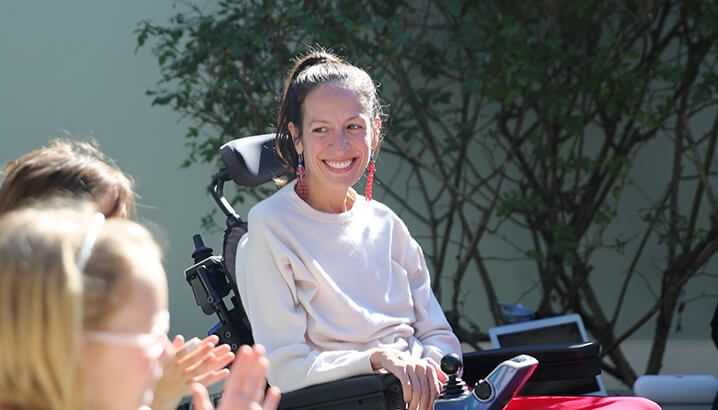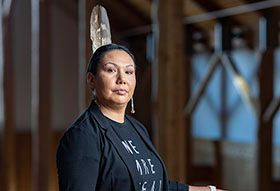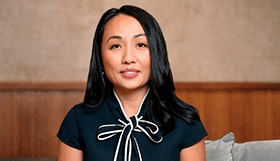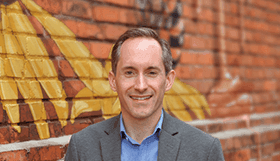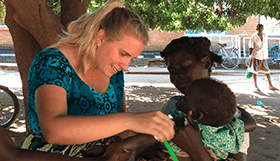WAA was very sorry to learn of the passing of Sarah Coglianese in November 2018. Her courageous example and service to UW–Madison are much appreciated, and she will be greatly missed.
UW Major: Journalism
Age: 39 | San Francisco
Writer, Speed4sarah.Com
Founder, #Whatwouldyougive Campaign
In 2015, Sarah Coglianese asked a big question: what would you give?
The question came three years after Coglianese — who, as a UW student,
enjoyed traveling, running, kickboxing, and, yes, parties — was diagnosed with the neurodegenerative disease amyotrophic lateral sclerosis, or ALS.
“Even as my body began to abandon me, my brain took over, and the lessons I had learned throughout my life began replaying themselves in my head,” she says. “Work. Stay busy. Make time for fun. And, above all, don’t give up when things get difficult.”
ALS, also known as Lou Gehrig’s disease, interferes with how the brain controls muscle movement. People with ALS lose the ability to use their arms and legs, and over time, they become unable to eat or breathe. They usually live two to five years after diagnosis.
“Although I am mostly paralyzed at this point, my job is still to teach my child how to be strong and how to be successful in a world that will throw many challenges her way.”
There is no cure yet for ALS — but Coglianese’s question may change that. Her #WhatWouldYouGive campaign has already raised more than $600,000 to advance research and promising treatments at the ALS Therapy Development Institute.
Unlike physical-challenge fundraisers such as a bike ride or a run, #WhatWouldYouGive asks people to spend time without using one of their abilities — their arms, their legs, their voice — to understand more about what it’s like day to day for people living with ALS.
Coglianese blogs at Speed4Sarah.com, and her work has been featured in the New York Times, Redbook magazine, CNN, and other outlets. She now writes using voice-recognition software, and she’s honest, positive, and funny as she shares how she and her husband, Rob, meet the challenges of living with ALS and raising their young daughter, Scarlett.
“Although I am mostly paralyzed at this point, my job is still to teach my child how to be strong and how to be successful in a world that will throw many challenges her way,” Coglianese says. “I know that my time at the University of Wisconsin helped me to embody those ideals.”
Q&A with Sarah
What’s the best piece of advice you’ve ever received?
When I was pregnant with [my daughter], Scarlett, I had a midwife, a German woman who was working towards becoming a Buddhist nun. After I got my diagnosis, she was one of the first people I went to see. I sat on her couch and cried into my tea. And she told me that I had to let those feelings of sadness wash over me, much the way she once told me to let contractions wash over me.
Don’t tighten against it. Don’t fight it off. Just accept the pain, accept the sadness, let it wash over you and then go away. It will come back. But I can’t control it any more than I can control the fog that is currently rushing across the Pacific Ocean and enveloping my house. Weather inside, weather outside.
What are you reading now?
Manhattan Beach by Jennifer Egan, and Wonder by R.J. Palacio, which I’m reading with my daughter.
What is the one thing every UW student must do?
If possible, study abroad. Meet new people and learn about a different culture. Try speaking the language. Go outside your comfort zone.
What advice would you offer to graduating seniors?
Practice interviewing for jobs. I was pretty hopeless at this when I first graduated, and I know UW provides resources to help you get better at it.
What occupies your free time?
Reading, writing, and acting as social secretary for my seven-year-old, which is far more involved than you might think (and that probably means I’m doing it wrong.)
What was your first job?
I delivered newspapers when I was 11. I always had ink on my hands and I worked for tips. No one actually subscribed to this newspaper, so when I showed up asking for money once a month, the reactions varied. Some people yelled, some invited me in for cookies. It was a weird job.
If you could trade places with any person for a week, living or dead, real or fictional, who would it be?
My daughter. I would love to get inside that little head and see everything that’s going on.
What is your favorite quote?
“I don’t ask for your pity, but just for your understanding — not even that — no. Just for some recognition of me in you, and the enemy, time, in us all.” — Tennessee Williams, Sweet Bird of Youth
“We die. That may be the meaning of life. But we do language. That may be the measure of our lives.” – Toni Morrison
Those are kind of dark quotes, but they speak to me, especially because of my disease, which has led me to question much about what we are all doing on this earth. Bob Dylan also talked about time as an enemy in the song Up To Me. I don’t necessarily think of time as an enemy myself, but I do like the idea of recognizing ourselves in each other, as well as the importance of language. Those are the things that humanize us, and that give us a certain responsibility to one another.
What lasting memories do you have of UW–Madison?
Far too many to list here. I have flashes of my college experience that feel like they happened yesterday. A lot of my memories revolve around my time bartending at Bullfeathers on State Street. I remember one night I was cleaning up after we stopped serving dinner, and this table of guys asked me to leave the mustard. It turned out they wanted shots of Jägermeister, which they then poured the mustard into. They called it a tapeworm. Obviously, I am still traumatized.
Mainly what I remember is the people I met. Some remain my best friends, and others who were once so important to me, I haven’t seen in almost 20 years. I used to think of this as a painful idea, leaving people behind or being left behind. But now I realize that we all have a role to play in each other’s lives, and for the most part, that role is brief.
Essay by Sarah
I’ll be honest. My first reaction when asked to describe how my time at the University of Wisconsin–Madison shaped me was probably not what the Forward Under 40 committee had in mind. It shaped me into a meatball, I thought to myself, as I recalled the taco bowls and pokey stix my friends and I devoured in our dorm rooms freshman year. When I got a job at a bar on State Street, fried cheese nuggets became a dietary staple. There was beer. And shots. I was changing shape, all right.
But of course, there’s more to it than that. I was always among friends. My first day of classes, my friend Andre, who I had gone to high school with, brought me to the Helen C. White library and told me how important it was to study in college. Dre was older and a good influence. He advised me to find all my classes in the days before they began, so I wouldn’t be rushing around lost and panicked on the first day. While this may seem like obvious advice, it had not occurred to me.
Meanwhile, in Chadbourne, I was making friends and realizing how much people from Wisconsin really, really liked the Green Bay Packers. I began working in one of the school cafeterias and learned to manage my time better than I had done in high school. Madison changed me from a procrastinator to someone who got things done early, because I knew that there were so many more things to do. I wrote articles for the Badger Herald and took a job in the Student Athletic Center, helping athletes in the computer lab and shushing them when it was time for us all to study. During my sophomore year, I had three jobs and got straight A’s. I learned that I liked and needed to be busy in order to be successful.
I managed to make plenty of time for fun, hanging out at the student union, going to parties, and meeting people who remain my good friends to this day. I went running on Lakeshore Path, worked out at the SERF, and took kickboxing classes. Alternating between work and play and exercise became an important balance that I have the carried with me ever since. Madison was my world, and I was determined to get everything I could out of my experience there. This included a semester abroad studying in Paris, learning French slang from the young kids I was living with, and traveling alone throughout Europe to visit friends who were studying in other cities.
Having always been an independent person, I found that the autonomy afforded to a college student was a good fit for my personality. It was time to become an adult, and I was ready. I had been prepared by my upbringing in Oak Park, Illinois, but I needed the college experience to solidify the person I was becoming.
I continued to eat fried cheese. Is there a more satisfying food?
My journalism major led to a career in book publishing in San Francisco and Manhattan. I met my husband, we had a baby girl, and then, when our daughter was a little over a year old, I started falling. It was strange and confusing, and within a year, I had been diagnosed with Amyotrophic Lateral Sclerosis (ALS), a neurodegenerative disease with no cure. My running days were over, and a wheelchair was looming in my future.
I was devastated and terrified, but even as my body began to abandon me, my brain took over, and the lessons I had learned throughout my life began replaying themselves in my head. Work. Stay busy. Make time for fun. And, above all, don’t give up when things get difficult.
Now I have a seven-year-old who is her own wildly independent person. People say she is like me. Although I am mostly paralyzed at this point, my job is still to teach my child how to be strong and how to be successful in a world that will throw many challenges her way. I know that my time at the University of Wisconsin helped me to embody those ideals, so that even if I can no longer be an active mom and person, I have plenty to offer.
In 2015, I founded a fundraising campaign called #whatwouldyougive that challenged healthy participants to give up an ability for a day in order to understand just a fraction of what life with ALS might be like. Since that time, we have raised more than $600,000 for ALS research. In total, my family and friends have raised almost $1,000,000.
At Madison, I learned how to hone my writing craft, and I was able to get published in the New York Times; Redbook magazine; CNN; Brain, Child magazine; and many more. Writing has always helped me get through tough times, and this has been no exception. We workshopped stories and gave presentations in my various classes, and those experiences helped build my confidence. I learned to experiment with different writing styles and to use humor to get a serious idea across. I learned to take criticism.
My college experience shaped me by allowing me to create habits that I will always carry with me. But it did so much more. Madison opened up its arms, and friends spilled out in droves. I would be nothing without these people — amazing human beings who continue to enrich my life. I learned who I was — a slightly spazzy, driven person who really needed to lay off the shots. I got healthy, and then I got sick. But through it all, I remain the woman who left Wisconsin with a degree and a network, and the understanding that without the support of friends, you can’t achieve very much at all.
